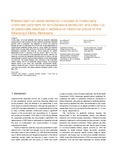| dc.contributor.author | Mokgadi, Janes | |
| dc.contributor.author | Batlokwa, Shima | |
| dc.contributor.author | Mosepele, Keta | |
| dc.contributor.author | Obuseng, Veronica | |
| dc.contributor.author | Torto, Nelson | |
| dc.date.accessioned | 2015-03-19T09:42:05Z | |
| dc.date.available | 2015-03-19T09:42:05Z | |
| dc.date.issued | 2013-10-08 | |
| dc.identifier.citation | Mokgadi Janes et.al. (2013) Pressurized hot water extraction coupled to molecularly imprinted polymers for simultaneous extraction and clean-up of pesticides residues in edible and medicinal plants of the Okavango Delta, Botswana, Molecular Imprinting, Vol. 1, pp. 55- 64 | en_US |
| dc.identifier.issn | 2084-8803 (Online) | |
| dc.identifier.uri | http://hdl.handle.net/10311/1350 | |
| dc.description.abstract | In this study, an in-cell extraction and clean-up approach, employing pressurized hot water extraction (PHWE) coupled to a molecularly imprinted polymer (MIP) is proposed. The selectivity of PHWE was improved through the use of a chlorophyll MIP (PHWE-MIP) for the determination of organochlorine pesticides residue levels in various edible and medicinal plants of the Okavango Delta, Botswana. The PHWE-MIP method achieved simultaneous extraction and clean-up. PHWE employed an optimal
temperature of 260 °C, pressure of 90 bar and flow rate of 1 mL min-1 in 10 min for the extraction of the pesticides from plants while the MIP selectively overcame the interfering chlorophyll prior to analysis with gas chromatograph coupled to electron capture detector or mass spectrometer
(GC-ECD/MS). The results obtained were compared to the QuEChERS Official Method 2007:01 for pesticides residue analysis. The proposed method seems to be nearly fully automated, environmental friendly, selective, simple and quick. Moreover, the recoveries of planar pesticides were improved (93-95%) with relative standard deviations (%RSD) of less than 10%. | en_US |
| dc.description.sponsorship | This work was supported United Nations Development Program – Global Environmental Facility – Small Grants Programme Botswana (UNDP-GEF/SGF-Botswana), Department of Chemistry, University of Botswana main campus as well as the Okavango Research Centre Institute (ORI), Andrew Mellon
Foundation and STINT (the Swedish Foundation for International Cooperation in Research and Higher Education, YR2009-7015). | en_US |
| dc.language.iso | en | en_US |
| dc.publisher | De Gruyter, http://www.degruyter.com/ | en_US |
| dc.rights | This work is licensed under the Creative Commons Attribution-NonCommercial-NoDerivs license,(http://creativecommons.org/licenses/by-nc-nd/3.0/), which means that the text may be used for non-commercial purposes, provided credit is given to the author. | en_US |
| dc.subject | Subcritical water extraction | en_US |
| dc.subject | Molecular imprinted polymers | en_US |
| dc.subject | In-cell clean up | en_US |
| dc.subject | Sample preparation | en_US |
| dc.subject | Environmentally friendly | en_US |
| dc.title | Pressurized hot water extraction coupled to molecularly imprinted polymers for simultaneous extraction and clean-up of pesticides residues in edible and medicinal plants of the Okavango Delta, Botswana | en_US |
| dc.type | Published Article | en_US |
| dc.link | http://www.degruyter.com/view/j/molim.2012.1.issue/molim-2013-0003/molim-2013-0003.xml | en_US |

